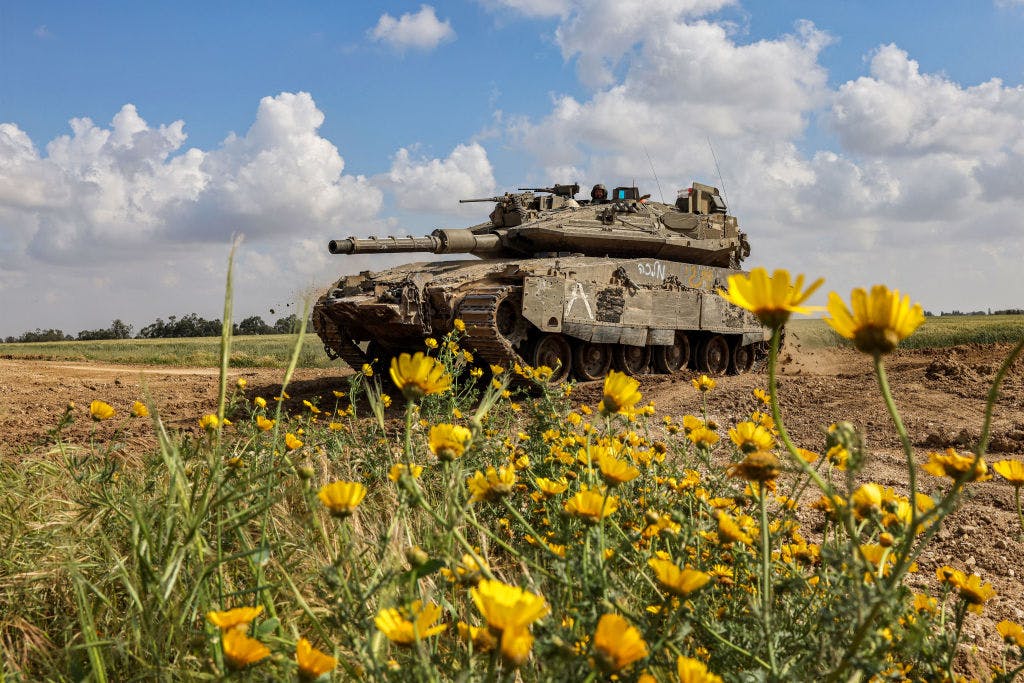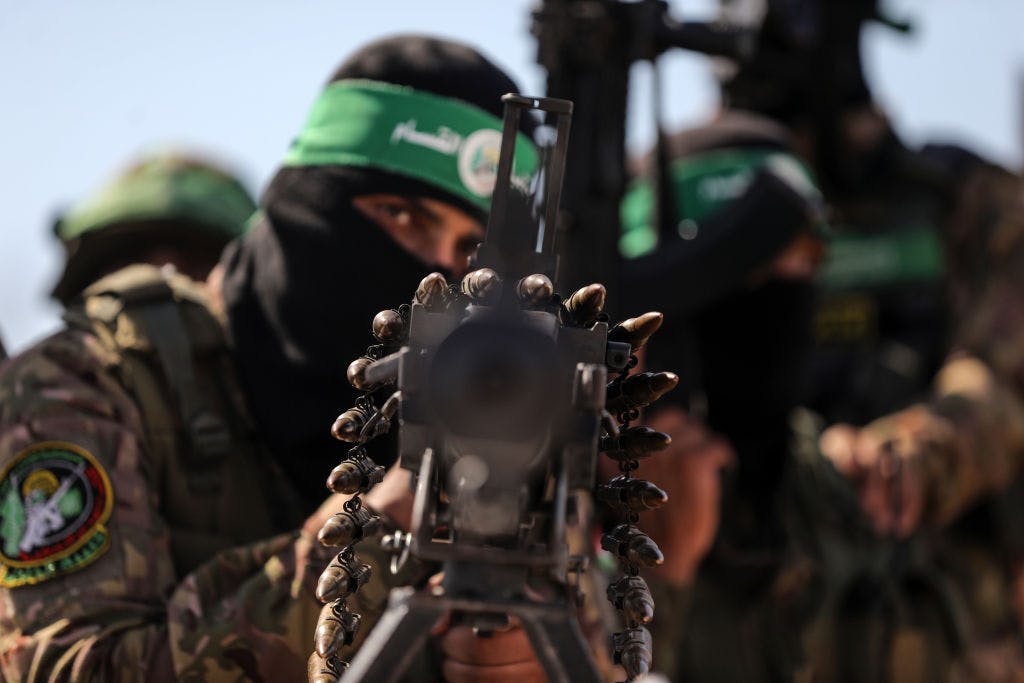Published: 9 April 2024
Last updated: 9 April 2024
Israel did not start the war in Gaza. It defended itself after Hamas’ vicious murders, rapes, and kidnappings on October 7, 2023.
The war’s two stated aims were the return of the hostages and the destruction of Hamas, a terrorist organisation which rules Gaza and is constitutionally committed to Israel’s complete destruction.
In October, the war was as justified as war can be. Any country attacked in this way would have done the same, and Western governments comprehensively supported Israel’s right to defend itself.
But if the initial reasons for the war are clear, the case for it continuing as we pass the six month mark is no longer convincing. Israel did not start the war, but Israel must end it now, for its own sake as well as for any hope for a peaceful future.
Fundamentally, the Israel-Hamas War has been a failure. It has not achieved the release of the hostages and it has not – and never could have – eliminated Hamas. In part, this is because the two stated aims are contradictory: Israel needs Hamas to be intact and functioning to be able to return the hostages.
The Israel Defence Forces (IDF) have achieved as much as they could in disabling Hamas temporarily, but they have done so at a terrible and continuing cost to Gazan civilians, to Israel’s commitment to human rights, and to Israel’s international standing. Israelis have also paid a significant price in IDF casualties and in the displacement of about 100,000 residents from the Gaza border and the north.
Israel must negotiate a permanent end to the war in exchange for the return of all hostages.
The primary issue remains the return of all the hostages who are still alive. Military action has failed to bring home the children, women and men who have now suffered through six months in appalling conditions. They must be the top priority for their own sakes and for the Gaza border communities who were left unprotected and were the primary victims of Hamas’s onslaught. Israel must negotiate a permanent end to the war in exchange for the return of all hostages.
Leaving Gaza now will also decrease the likelihood of escalation into a full scale Middle East War, defusing tensions with Hezbollah and Iran which have increased since an air strike on Iran’s Damascus consulate killed two senior Iranian commanders last week.
The longer-term issue is the establishment of secure and viable homes for both Israelis and Palestinians, which requires the removal of Hamas. Here the international community needs to step in and ensure that if Israel withdraws from Gaza, international efforts will support the process of building a viable government for Palestinians that recognises Israel’s right to exist and, ultimately, creates a Palestinian state with security guarantees for Israel.
The deaths of seven aid workers exposed the unacceptable moral calculus by which the IDF were willing to risk the lives of many innocents in the hope of killing one terrorist
Israeli Prime Minister Benjamin Netanyahu has refused to prioritise the return of the hostages over trying to destroy Hamas. But his catchphrase of “total victory” is meaningless. Hamas is deeply embedded in the Gazan population – even including the UN humanitarian aid infrastructure of UNWRA. Distinguishing between combatants and civilians has proved to be impossible.
Short of an unthinkable genocide against the entire population of Gaza, no military action will exterminate Hamas. Islamic fundamentalist terrorism has not been fully vanquished anywhere in the Middle East entirely by military means, and Gaza is no exception.
By continuing the war, Israel is only adding to the anger of a new generation of Hamasniks, radicalised Palestinian refugees who experience Israel as an oppressor and believe that October 7 was a justified attack on an enemy to be vanquished by any means necessary.
Blowing up terrorist bases may have disabled the terrorists in the short term, but the toll has been too high for Gaza and for Israel. Even by Israel’s own calculation, two thirds of the estimated 33,000 people who have been killed in Gaza are civilians. More than 1.5 million people have been left homeless. Save the Children estimates just over 2% of Gaza’s child population, some 26,000 children, have been injured or killed. The UN food program has warned parts of the region are at dire risk of famine.
Epidemiologists have warned that if the humanitarian crisis in Gaza continues, the death toll could reach 100,000 – or even top 120,000.
The deaths of seven international aid workers last week have brought matters to a head. These losses focused international attention on the failure of Israel to protect civilians and the desperate need for aid.
They also exposed the unacceptable moral calculus by which the IDF were willing to risk the lives of many innocents in the hope of killing one terrorist. When those innocents happened to be internationals, the world noticed.
The damage done to Israel’s international reputation is huge. The war has fuelled a growing section of the international community, whose response to October 7 is not “Stand with Israel” but “Free Palestine”.
Even Israel’s staunchest allies such as US President Joe Biden have had it with Netanyahu’s trigger-happy conduct of the war and Israel’s determination to proceed with an invasion of Rafah, whatever the cost.
The internal damage is also huge. After October 7, Israel was a deeply traumatised society. That trauma has been translated into anger, violence and sense a self-justification that is deeply dangerous. Six months of patriotic media coverage, of glorifying militarism, and of dissolving relations between Jewish and Palestinian Israelis has left Israel a poorer society.
The drift towards extreme nationalism, already begun with the incorporation of the Religious Zionists into the current coalition, has worsened. The country is being led by a very unpopular Prime Minister who is known for dishonesty and for being motivated by personal rather than national interests.
The sooner Israel holds elections and votes to remove Netanyahu from office, the better. The Prime Minister is at least partially responsible for the failures that led to October 7 – both the security failures and because his policies supported the growth of Hamas as a means of undermining the Palestinian Authority.
Finding new leadership for the Palestinian people is also critical, both in Gaza, where Hamas must ultimately be replaced by a government willing to care for its own people and live with Israel, and in the West Bank, where the PA is aged, corrupt, and lacking popular support. The two state solution has lost appeal among Palestinians, so it is a much more difficult task than it was. Removing Hamas and rebuilding Gaza will require sustained investment from the international community.
But it cannot begin until the war ends and Israel acknowledges that the solution to its pain and trauma is not the continuing infliction of pain and trauma in return.
RELATED NEWS
Netanyahu sets date for Rafah operation, pushes back at US (Jerusalem Post)
National Security Minister Itamar Ben-Gvir threatened to leave the government if the IDF did not enter Rafah or if it prematurely ended the war.
Epidemics, famine, untreated wounds: things are about to get much worse in Gaza (Haaretz)
Epidemiologists warn that if the humanitarian crisis in Gaza continues, the death toll could reach 100,000 – or even top 120,000
IDF sacks officers over World Central Kitchen convoy attack (BBC)
Two senior Israeli military officers have been sacked after seven aid workers were killed in missile strikes in the Gaza Strip.
Former Defence chief Mark Binksin appointed to scrutinise investigation into Israeli air strike (ABC)A former high-ranking military officer will lead Australia's examination of Israel's investigation into a fatal air strike on an aid convoy.
RELATED ANALYSIS
Analysis: Are we on the cusp of a ceasefire and hostage deal? (Forward)
Signs point to a deal within the coming days that would release less than half of the hostages still believed to be alive.
Obstacles to peace seem larger than ever after six months of war (Jeremy Bowen, BBC)
Six months after the Hamas attacks on Israel, war, disease, starvation and death ravage Palestinians in Gaza. Israel is deeply divided, as its prime minister struggles to keep his promise of total victory. The United States, Israel's most essential ally, has turned against the way it is fighting the war.
Six months on, how close is Israel to eliminating Hamas? (Merlyn Thomas & Jake Horton, BBC)
It has been nearly six months since Hamas fighters broke through from Gaza into Israel on 7 October, killing about 1,200 people and taking hundreds hostage.
After six months, few of the Israel-Gaza War's goals have been achieved (Amos Harel, Haaretz)
Though there was a measure of logic to mount a ground invasion of Gaza, the failures have to be acknowledged: Expectations were too high, tensions with U.S. have spiked, and the hostages are still in Gaza.
Together we will win? Poll shows that Israel is more divided than ever (Sivan Klingbail, Haaretz)
Hamas' October 7 massacre and the ensuing war in Gaza haven't closed the rifts, but there is hope for a new sociopolitical contract, the Israel Democracy Institute says.





Comments2
Wesley Parish10 April at 08:31 am
Re: “Any country attacked in this way would have done the same, and Western governments comprehensively supported Israel’s right to defend itself.”
I’m wondering, during the Great March of Return 2018-2019, unarmed Palestinians were regularly shot by IDF marksmen. The narrative over the term of my natural life has been that “Israel is always justified in anything it does, whereas the Palestinians are born terrorists and deserve no sympathy for anything”. Replace “Israel” with “Germany”, and “Palestinian” with “Jew” and you wind up with the Nazi German spiel. That incidentally killed off my distant Krakow relatives.
If a similar thing happened in a metropolitan Western state such as France, where foreign workers were protesting peacefully, and the French army opened fire, what would the response be? That France has the inalienable right to do what it likes to whoever it likes on its own territory?
Or to take a more Australian example, just think of the various similar incidents that are slowly being brought to life in the British treatment of the Australian First Nations.
David Frankel9 April at 08:49 pm
I find your naiveite, shocking. You seem to be like Neville Chamberland, war is too hard and too costly. We have to admit, we can’t defeat Hamas because of their strategy of using Human shields, propaganda and international Anti Semitism. We can rely on the international community to ensure peace. Apart from the fact that the UN is meant to keep Hezbollah in check, how is that working out? Winston Churchill warned, “You cannot reason with a tiger when your head is in its mouth.”